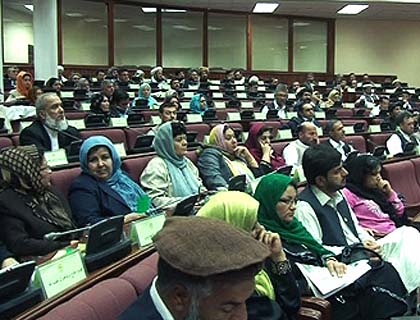KABUL - Members of the Wolesi Jirga or Lower House of the Parliament have accused government officials of delaying the ratification of a critical anti-money laundering law in order to protect their interests tied up in administrative corruption.
They have suggested there have been attempts to alter the legislation in order to avoid a harm to those interests.
MP Naheed Fareed said on Thursday that officials have tried to hamper dialogue in Parliament over the Anti-Money Laundering Law and administrative corruption within the government.
"Those who created obstacles to prevent the ratification of this law are still trying ...It's the same government institutions that are accused of corruption," Mr. Fareed said. "There are activities to stymie financial and economic debate, meetings and opinions surrounding the law."
Knowing the pressure Afghan leaders under due to warnings from the intergovernmental Financial Action Task Force (FATF) that Afghanistan could be placed on their blacklist if no concerted steps are taken to combat money laundering, representative Fareed added "But luckily, time is limited and MPs know that this law must be ratified appropriately."
Economic experts inside and outside Afghanistan have said that the country could face a devastating economic crisis if added to FATF's blacklist, which would likely scare away all major foreign investors and hamper international aid processes.
Despite supposed attempts to silence it, debate surrounding the content of the Anti-Money Laundering Law, which follows in the wake of a terrorism financing prevention law passed by Parliament earlier this week, remains contentious.
The Governor of the Afghan Central Bank, Noorullah Delawari, said previously that the omission of a number of articles from the Anti-Money Laundering Law draft sent to Parliament would make it imperfect and unacceptable to the international community.
However, the Acting Minister of Justice, Muhammad Yousuf Haleem, has said that some of the articles that were included in the Central Bank's original draft were redundant, suggesting the newer draft is merely a consolidated one. He said articles regarding extradition, judicial cooperation, signing of MoUs and sovereignty of financial intelligence at the Central Bank were among those that were redundant.
"The anti-money laundering law was sent in 45 articles to Parliament," Acting Minister Haleem said. "The draft that the Central Bank first sent to the Ministry had 70 articles, but some content was repeated,"
Meanwhile, the Afghan Private Banking Association has expressed support for the Central Bank's draft.
"When this law is ratified and implemented, many activities that turn black money into white money will be limited," Afghan Private Banking Association head Khalil Sediq said.
Anti-money laundering legislation is common in most developed countries around the world. Given the prevalence of administrative corruption in Afghanistan, many in Parliament have looked to ratify laws against laundering and financing terrorism before. The current law awaiting a vote has taken more than two years. (Tolonews)

